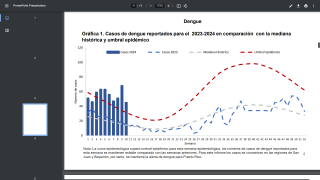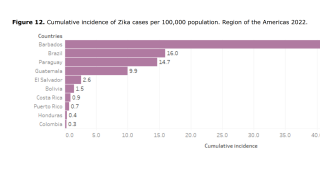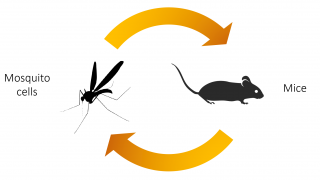Unusual Antibody Displays Ultrapotent Activity Against Zika Virus

The peer-review journal Cell recently published a study that identifies a role for antibodies of the IgM isotype in protection against the Zika virus (ZIKV) and posits it is a safe and compelling candidate for immunotherapeutic, particularly during pregnancy.
Because ZIKV can cause congenital disabilities when passed to a fetus, this discovery could lead to the development of therapies to protect babies from the potentially devastating effects of this mosquito-borne disease.
This finding is essential since congenital ZIKV infections result in neurodevelopmental deficits in up to 14% of infants born to ZIKV-infected mothers.
Furthermore, the U.S. FDA has not approved a ZIKV vaccine candidate as of December 6, 2022.
Neutralizing antibodies are a critical component of protective immunity, stated researchers from Weill Cornell Medicine, NewYork-Presbyterian and National Institutes of Health investigators.
From a ZIKV-infected pregnant woman, they isolated a pentameric ZIKV-specific IgM (DH1017.IgM) that exhibited ultrapotent ZIKV neutralization dependent on the IgM isotype.
They demonstrated that plasma IgM contributes to ZIKV immunity in pregnancy, mediating neutralization up to three months post-symptoms.
DH1017.IgM targets an envelope dimer epitope within domain II. The epitope arrangement on the virion is compatible with the concurrent engagement of all ten antigen-binding sites of DH1017.IgM, as a solution not available to IgG.
DH1017.IgM protected mice against viremia upon lethal ZIKV challenge more efficiently than when expressed as an IgG.
According to the study co-senior author Dr. Sallie Permar, the important thing is that we've got to be ready for another outbreak of Zika.
At this point, doctors have no approved vaccines or treatments to offer patients. However, with further research, this antibody has the potential to help fill that gap, according to Dr. Permar.
"There are two potential ways it could be used: To quickly reduce levels of Zika in the blood of pregnant people who have become infected, or as a preventative measure given to those at risk of contracting the virus during an outbreak," stated Permar in a press release on November 18, 2022.
To develop the antibody into a real-world therapy, the researchers plan to test its safety and how effectively it can prevent transmission to a fetus in additional preclinical models.
Dr. Permar emphasized that when human studies for new preventive or therapeutic treatments are done for Zika, they must be included. "Pregnant women, the population that needs vaccines or immunotherapies for Zika."
"It's crucial to get anti-Zika vaccines and therapies that are safe in pregnancy rolled out as soon as there is evidence of an outbreak."
While infected mosquitoes primarily spread ZIKV, it can also be passed during sex from a person infected with ZIKV to a sexual partner, says the U.S. CDC.
As of December 2022, Brazil, India, and Puerto Rico (15 probable) have reported Zika cases.
This research was supported by NIAID grant R21-AI123677.
Many Weill Cornell Medicine physicians and scientists maintain relationships and collaborate with external organizations to foster scientific innovation and provide expert guidance.
ZikaNews publishes fact-checked, research-based news manually curated for mobile readers.
Our Trust Standards: Medical Advisory Committee
























